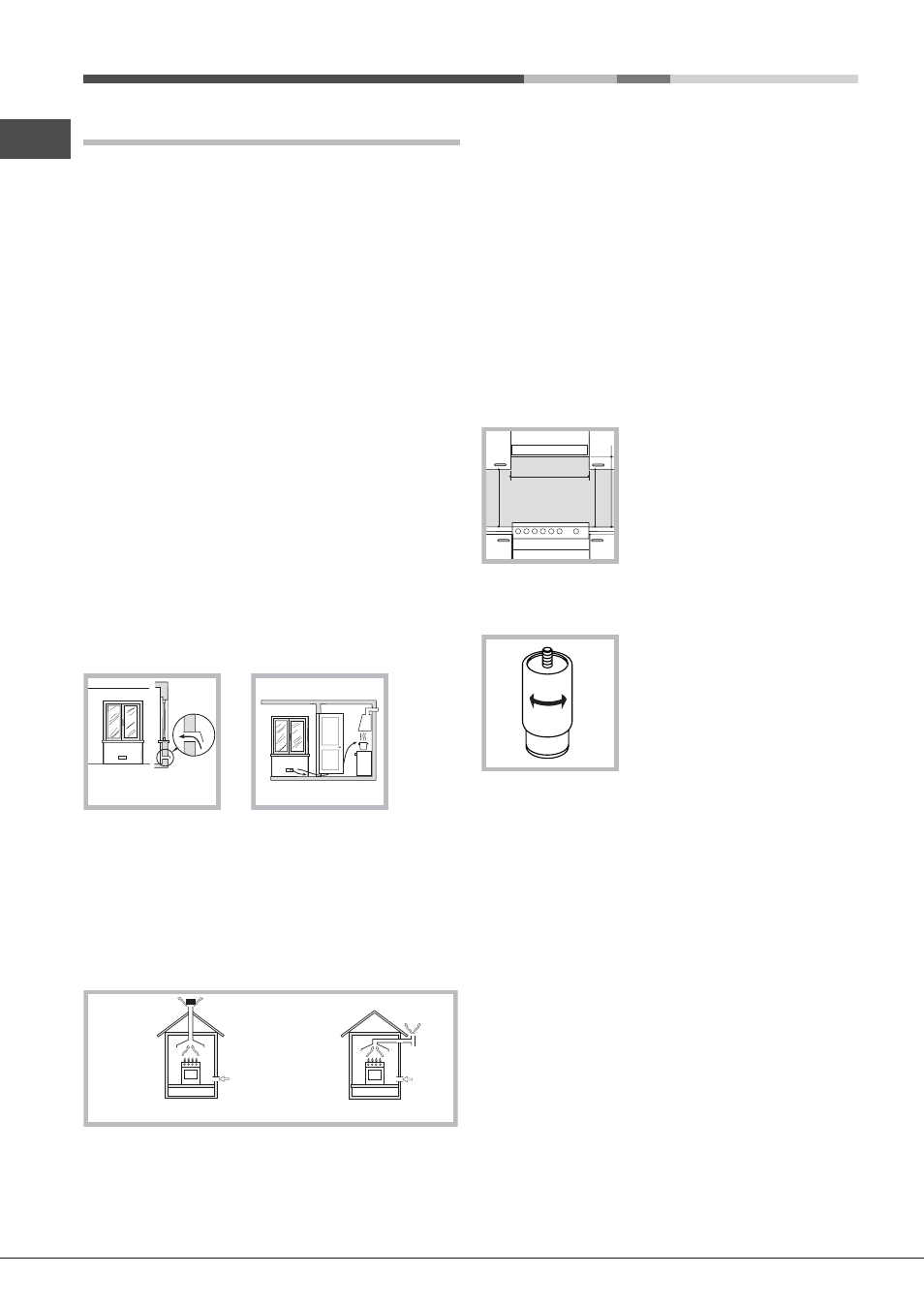Installation, Positioning and levelling, Electrical connection – Hotpoint Ariston CP97SG1 /HA S User Manual
Page 18

18
GB
Installation
! Before placing your new appliance into operation please read these operating
instructions carefully. It contains important information concerning the safe
installation and operation of the appliance.
! Please keep these operating instructions for future reference. Make sure that
the instructions are kept with the appliance if it is sold, given away or moved.
! The appliance must be installed by a qualified professional in accordance
with the instructions provided.
! Any necessary adjustment or maintenance must be performed after the
cooker has been disconnected from the electricity supply.
The cookers have the following technical specifications:
Category: II 2H3+
Room ventilation
The appliance may only be installed in permanently-ventilated rooms,
according to current national legislation. The room in which the appliance is
installed must be ventilated adequately in order to provide as much air as is
needed by the normal gas combustion process (the flow of air must not be
lower than 2 m
3
/h per kW of installed power).
The air inlets, protected by grilles, should have a duct with an inner cross
section of at least 100 cm
2
and should be positioned so that they are not liable
to even partial obstruction (see figure A).
These inlets should be enlarged by 100% - with a minimum of 200 cm
2
-
whenever the surface of the hob is not equipped with a flame failure safety
device. When the flow of air is provided in an indirect manner from adjacent
rooms (see figure B), provided that these are not communal parts of a building,
areas with increased fire hazards or bedrooms, the inlets should be fitted with
a ventilation duct leading outside as described above.
A
Examples of
ventilation holes
for comburant air.
Enlarging the ventilation slot
between window and floor.
Adjacent
Room
Room to be
Vented
A B
! After prolonged use of the appliance, it is advisable to open a window or
increase the speed of any fans used.
Disposing of combustion fumes
The efficient disposal of combustion fumes should be guaranteed using a
hood which is connected to a safe and efficient natural suction chimney, or
using an electric fan which begins to operate automatically every time the
appliance is switched on (see figure).
In a chimney stack or branched flue.
(exclusively for cooking appliances)
Directly to
the Outside
! The liquefied petroleum gases are heavier than air and collect by the floor,
therefore all rooms containing LPG cylinders must have openings leading
outside so that any leaked gas can escape easily. LPG cylinders, therefore,
whether partially or completely full, must not be installed or stored in rooms or
storage areas which are below ground level (cellars, etc.). Only the cylinder
being used should be stored in the room; this should also be kept well
away from sources of heat (ovens, chimneys, stoves) which may cause the
temperature of the cylinder to rise above 50°C.
Positioning and levelling
! The appliance may be installed alongside any cupboards whose height does
not exceed that of the hob surface.
! Make sure that the wall in contact with the back of the appliance is made
from a non-flammable, heat-resistant material (T 90°C).
To install the appliance correctly:
• Place it in the kitchen, the dining room or the studio flat (not in the
bathroom).
• If the top of the hob is higher than the cupboards, the appliance must be
installed at least 500 mm away from them.
HOOD
420
Min.
min.
65
0
mm. with hood
min.
70
0
mm. without hood
mm.
600
Min.
mm.
420
Min.
mm.
• If the cooker is installed underneath a wall
cabinet, there must be a minimum distance
of 420 mm between this cabinet and the top
of the hob.
This distance should be increased to 700 mm
if the wall cabinets are flammable (see figure).
• Do not position blinds behind the cooker or
less than 200 mm away from its sides.
• Any hoods must be installed in accordance
with the instructions listed in the relevant operating manual.
Levelling
If it is necessary to level the appliance, screw
the adjustable feet into the places provided
on each corner of the base of the cooker (see
figure).
Electrical connection
Install a standardised plug corresponding to the load indicated on the appliance
data plate (see Technical data table).
The appliance must be directly connected to the mains using an omnipolar
switch with a minimum contact opening of 3 mm installed between the
appliance and the mains. The switch must be suitable for the charge indicated
and must comply with current electrical regulations (the earthing wire must not
be interrupted by the switch). The supply cable must be positioned so that it
does not come into contact with temperatures higher than 50°C at any point.
Before connecting the appliance to the power supply, make sure that:
• The appliance is earthed and the plug is compliant with the law.
• The socket can withstand the maximum power of the appliance, which is
indicated by the data plate.
• The voltage is in the range between the values indicated on the data plate.
• The socket is compatible with the plug of the appliance. If the socket is
incompatible with the plug, ask an authorised technician to replace it. Do
not use extension cords or multiple sockets.
! Once the appliance has been installed, the power supply cable and the
electrical socket must be easily accessible.
! The cable must not be bent or compressed.
! The cable must be checked regularly and replaced by authorised technicians
only.